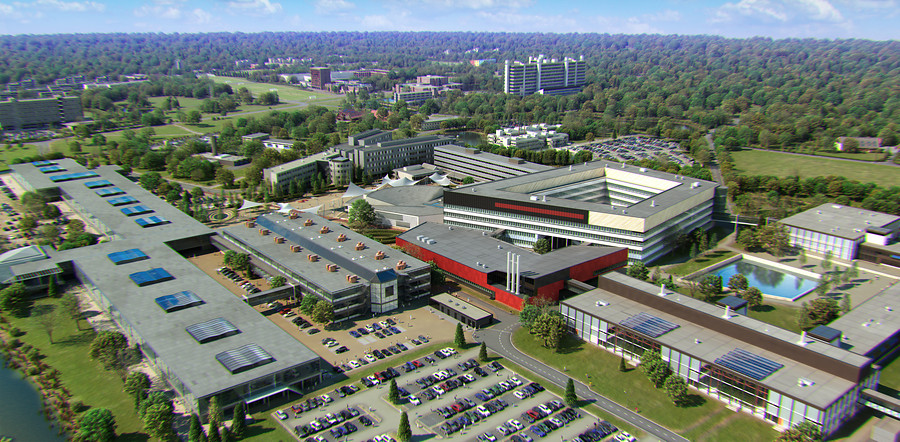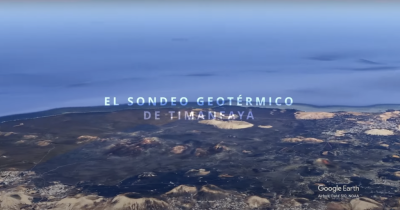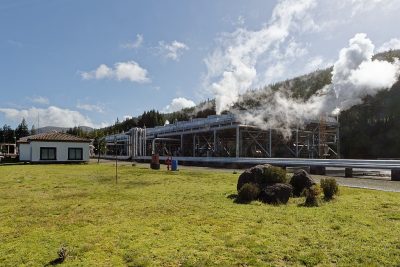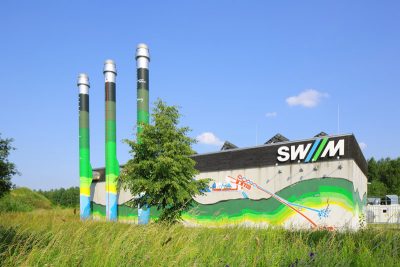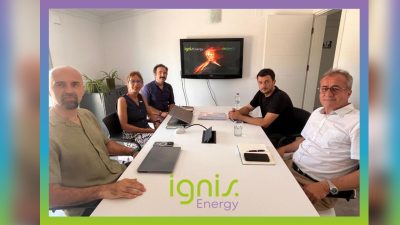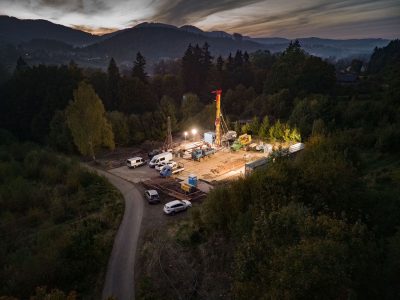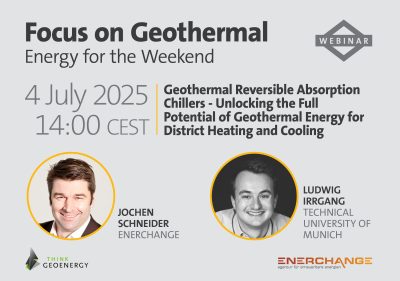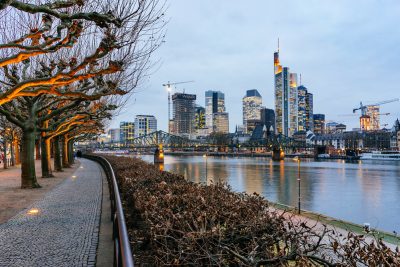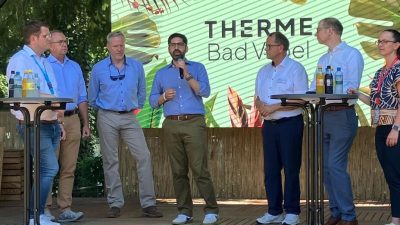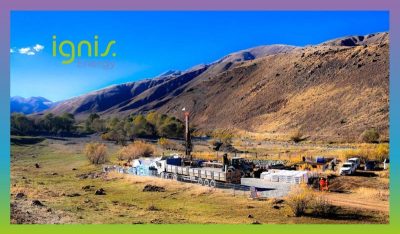Job – PostDoc researcher, geothermal hotspot detection, University of Twente
For a research project utilizing NASA's ECOSTRESS mission on the International Space Station, the University of Twente is seeking for applications for a Postdoc position for a researcher in geothermal hotspot detection.
The University of Twente in the Netherlands has published an open position for a postdoctoral researcher in geothermal hotspot detection from ecostress data. The research is tied to a news piece on “geothermal exploration from space” we posted earlier this week.
Geothermal resources are essential in the global transition to renewable energy sources. Spaceborne thermal infrared (TIR) sensors in a sun-synchronous orbit (e.g., ASTER, Landsat TIRS) can be used to detect thermal surface temperature anomalies (or “hotspots”) associated with geothermal systems. Up to now, detection of geothermal anomalies from spaceborne sensors appears restricted to the most optimal circumstances, where anomalies are large in size (compared to sensor’s pixel size) and show considerably higher temperatures than the background values.
In this research project you will utilize NASA’s ECOSTRESS mission on the International Space Station in a novel way to investigate thermal hotspots in soils and rocks at the Earth’s surface. You will use the specific orbit of the ISS to develop an innovative processing chain that investigates anomalous cooling behaviour of the surfaces in the study areas in nighttime thermal time series as in indication of geothermal hotspots. In the second part of the research you will combine ECOSTRESS time series data with geostationary weather satellite datasets through a spatial modelling approach. This merged product will provide a super-temporal resolution time series, with the high spatial details from ECOSTRESS data, corrected for the general temperature trend by high temporal resolution data from the weather satellites.
In all parts of the research, the possibility of roll-out to a near-global detection system is essential. This will inspire the tools and materials that you will develop. You will also communicate your results to scientific peers (ISI journals; ECOSTRESS user community; conferences) as well as to practitioners (e.g. geothermal companies) through stakeholder meetings, and creation of short-courses or online tutorials.
This position is linked to the 3-year research project Geothermal hotspot detection from Space Station-based ECOSTRESS data (GeoHot) funded by the Dutch Research Council (NWO).
Your profile
You are a remote sensing specialist with experience in quantitative signal processing techniques in the thermal infrared domain.
You have:
- a PhD in remote sensing, meteorology or physics (preferably with a strong thermal infrared component, and with experience in advanced image / signal / data processing, and in extracting quantitative parameters of our physical environment)
- Experience with handling large and complex datasets through programming and / or scripting solutions
- An aptitude for quantitative empirical analysis techniques, including for example machine learning
- An excellent command of English and proven track record in scientific writing and publishing of your research results in high-end international journals in the field
- A willingness to travel to international field study sites on different continents
Knowledge on one, or more, of the following topics would be a bonus:
- Advanced programming and scripting skills with Python
- Knowledge of geothermal systems, the solid earth and its vegetation cover
- Strong team work and project management skills
There are opportunities to advise MSc and PhD graduate students, and teach graduate courses in your speciality.
Our offer
We offer you an inspiring multidisciplinary and challenging international and academic environment. The university offers a dynamic ecosystem with enthusiastic colleagues in which internationalisation is an important part of the strategic agenda.
You will be employed for 3 years. Salary and conditions will be in accordance with the Collective Labour Agreement (CAO-NU) of the Dutch Universities.
- Gross monthly salary between € 2,790.- and € 4,402.- depending on experience and qualifications in case of fulltime employment (job profile Researcher level 4).
- A holiday allowance of 8% of the gross annual salary and a year-end bonus of 8.3%;
- A solid pension scheme;
- A minimum of 41 holiday days in case of fulltime employment;
- Excellent support for research and facilities for professional and personal development
- Costs for moving to Enschede may be reimbursed.
Information and application
Additional information about this position can be obtained from Dr. Chris Hecker (e-mail: c.a.hecker@utwente.nl). You are also invited to visit our homepage.
Please submit your application before 14 November 2020 (choose “apply now” below). Your application has to include (i) a motivation letter clearly stating how you meet the selection criteria and also outlining your research interests, and (ii) a detailed CV with references. Applications that do not include both documents will not be considered.
About the Department
The Department of Earth Systems Analysis of the faculty of Geo-information Science and Earth Observation at the University of Twente is looking for a postdoctoral researcher with experience in quantitative thermal infrared remote sensing for a project on the detection of geothermal anomalies on a regional to global scale. The Department of Earth Systems Analysis combines Earth science knowledge with spatial modelling and advanced remote sensing to understand Earth processes in space and time. Our education and research contribute to the sustainable use of energy and Earth resources and help reduce disaster risk and the impact of natural hazards on society.
About the organization
University of Twente (UT)
University of Twente (UT) has entered the new decade with an ambitious, new vision, mission and strategy. As ‘the ultimate people-first university of technology’ we are rapidly expanding on our High Tech Human Touch philosophy and the unique role it affords us in society. Everything we do is aimed at maximum impact on people, society and connections through the sustainable utilisation of science and technology. We want to contribute to the development of a fair, digital and sustainable society through our open, inclusive and entrepreneurial attitude. This attitude permeates everything we do and is present in every one of UT’s departments and faculties. Building on our rich legacy in merging technical and social sciences, we focus on five distinguishing research domains: Improving healthcare by personalised technologies; Creating intelligent manufacturing systems; Shaping our world with smart materials; Engineering our digital society; and Engineering for a resilient world.
As an employer, University of Twente offers jobs that matter. We equip you as a staff member to shape new opportunities both for yourself and for our society. With us, you will be part of a leading tech university that is changing our world for the better. We offer an open, inclusive and entrepreneurial climate, in which we encourage you to make healthy choices, for example, with our flexible, customisable conditions.
Source: University of Twente
